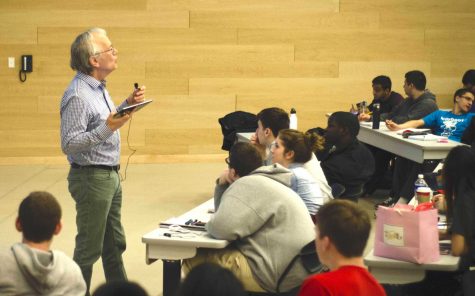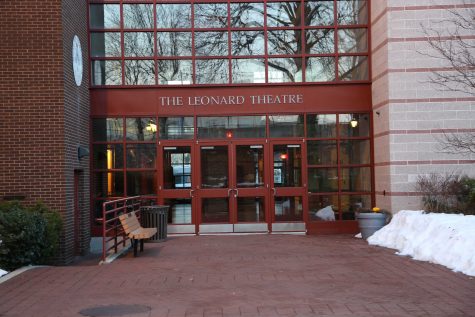Political Polarization Can Cloud Serious Issues
Courtesy of Ram Archives
Members of the Fordham community were forced to adjust quickly during coronavirus cancellations. (Courtesy of Ram Archives)
September 27, 2017

Sexual violence, in any capacity, is a travesty regardless of political allegiance. (Courtesy of Spencer Krell)
Controversy—a disagreement, typically prolonged, public and heated.
The word controversy has become a staple of American society. Our politics are littered in it. Twenty first century political polarization has instilled in America a climate of disagreement, of pure and utter animosity. Americans have become crippled. Our culture is plagued with individuals who are unable to accurately assess a situation without immediately jumping to a side and ignoring opposing opinions. This “polarization” has virtually made every topic debatable. Even those that should not be debated, such as rape and sexual misconduct.
On Aug. 18, 2017, Christopher Rodgers, dean of students at Fordham College at Rose Hill decided to demonstrate this sad and unfortunate reality of American culture. During the Fall 2017 Resident Assistant Training, Rodgers presented the polarizing arguments which have been made about rape and sexual misconduct. Unfortunately, due to the audience’s misunderstanding and a lack of clarification by Rodgers, his comments spurred uproar among some of the Resident Assistant trainees. Subsequently, an investigation has been launched on Dean Rodgers’ remarks by Fordham University’s Department of Public Safety and the Title IX Coordinator.
In a 2009 article for the Washington City Paper, journalist Amanda Hess explains that, “Whenever a high-profile rape accusation becomes public knowledge, commentators tend to gravitate to one side of the story, regardless of the outcome of the case.” She makes the claim that people are polarized and that they divide themselves: “On one side are people who are concerned about the problem of rape. On the other, people who are concerned about the problem of false rape accusations.” It is important to note that in the end, virtually all people want the same thing—an end to rape. Both “sides” want to achieve this. Unfortunately, polarization hinders the potential for us to actively diminish the number of rapes within the United States.
To showcase the fact that a division is present among those with opinions on the subject of rape and sexual misconduct, Dean Rodgers decided to focus on the difference in how the “right” and the “left” perceive rape and “rape culture.” As evidence, Rodgers employed two videos. The first video, used to display a right-wing perspective to the issue of sexual assaults on college campuses, was a PragerU video entitled “Are 1 in 5 women raped in college.” The video looked to discredit the widely cited statistic that 20 percent of college females are subject to some sort of sexual assault. It was, in essence, a criticism of the idea that a rape epidemic exists on college campuses.
The second video, used by Rodgers in an effort to epitomize the standpoint of left-wing Americans on the subject of rape culture within college campuses, was the trailer to a CNN documentary entitled “The Hunting Ground.” The trailer shows how an abundant amount of sexual misconduct cases have been mishandled by universities across America. The trailer looks to expose colleges and claims that universities frequently cover up rape and sexual assault cases to “protect a brand.” The video makes it look as though at universities, “Sexual assaults [are] expected.” The videos are both incorrect in the way they display “rape culture.” Dean Rodgers made this fact especially clear. It is wrong to disregard the fact that sexual assaults exist on college campuses. It is also wrong to claim that universities across the country as a whole victimize sexual assault victims. Both of these opinions can bring people to lose faith in how universities handle rape accusations.
Sexual assault should not be politicized. Dean Rodgers looked to emphasize this point. Rodgers simply looked to warn RAs about the dangers of political polarization’s influence on rape. Many argue that RA training was not the time nor place to make a point about the fact that rape has become polarized. In a public statement, honors student and RA Rowan Hornbeck exclaimed that putting advocacy for victims in a political context was wrong and inappropriate. According to the statement, RAs found the videos upsetting. It is important to note RAs are mandatory Title IX reporters, and that their job entails helping students deal with issues such as assault. Many issues thrown at them may be tough to deal with. They should be able to deal with sensitive issues and topics such as those displayed in the videos.
The opinions present within the videos shown by Dean Rodgers were both skewed. In particular, the PragerU video was, in my opinion, tough to watch. Dean Rodgers made clear that the video was wrong and that it was a product of the alt-right. After recognizing the unfortunate truth that many do indeed politicize rape and sexual misconduct, it becomes very clear that Dean Rodgers sentiments were wholesome in nature. Rodgers intentions were not meant to be insensitive or dismissive to sexual misconduct cases. On the contrary, Rodgers worked to explain to RAs, one of the main outlets for students to voice sexual assaults, the dangers which polarization brings to the handling of university rape and sexual misconduct cases.
Faustino Galante, FCRH ’20, is a psychology major from Buffalo, New York.










If you want a picture to show with your comment, go get a gravatar.